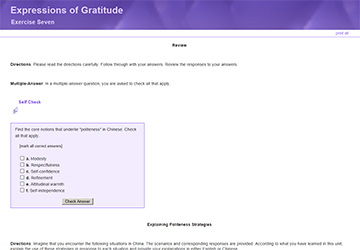Unit 7: Thanking Strategies and Politeness in Chinese
Unit 7 reviews the politeness principles and cultural values that underlie appropriate expressions of gratitude in Chinese and explains why Chinese speakers choose to express gratitude by way of apologizing and showing care.
7.1 Goal of Unit 7
The goal of Unit 7 is to review politeness in Chinese to students, and help them learn about the underlying cultural values that constrain speakers' use of the two indirect thanking strategies (i.e., by way of apologizing and showing care) to express gratitude in Chinese.
7.2 Politeness in Chinese
Expressions of gratitude in Chinese are constrained by politeness in Chinese. According to Gu (1990) and Bi (1996a), there are four notions underlying politeness in Chinese, including respectfulness, modesty, attitudinal warmth, and refinement. The notions of respectfulness and attitudinal warmth refer to the self’s demonstration of admiration, consideration, and kindness to others. In other words, what counts as a polite behavior is to think from others’ perspectives and to show understanding and consideration toward others. On the other hand, the notion of modesty is understood as self-denigration, while refinement is to modify the self’s behavior for meeting certain standards.
Thinking: How are western politeness reflected in American English? What are the differences between politeness in Chinese and in American English?
7.3 About the Strategy of “Apologizing”
According to politeness in Chinese, Chinese speakers think from others' perspectives and show consideration toward others. Therefore, speakers often choose to use the strategy of apologizing to express their appreciation in Chinese.
After receiving a favor from others, speakers believe the favor might have caused much trouble or inconvenience to the person. So they apologize to this person for the possible trouble or inconvenience that originates from the favor he or she did for the speakers. In this way do Chinese speakers think that they have fully shown their kindness and consideration to the person, and thus the apologizing strategy is considered a polite and appropriate way to express gratitude in Chinese.
Though some expressions that belong to apologizing strategy might also be used to make apologies in Chinese, it should be noted that these apologetic expressions are used here to indicate the function of expressing gratitude rather than making apologies.
Thinking: Thanking back on what you learned in Unit 5, how many thanking expressions categorized into this category did you remember?
7.4 About the Strategy of “Showing Care”
According to politeness in Chinese, especially the two underlying notions of respectfulness and attitudinal warmth, Chinese speakers should show care and consideration to others. Therefore, speakers often choose to express their gratitude by way of showing care in Chinese.
After receiving a favor from a person, the speaker believes that the favor might have taken a lot of effort and time from this person. Therefore, the speaker should show his/her care toward this person to express gratitude, such as "drink some water and have a rest." In this way do Chinese speakers think they comply with the principles underlying the politeness in Chinese, and this type of indirect thanking strategy is considered polite and appropriate.
Thinking: Thanking back on what you learned in Unit 5, how many thanking expressions categorized into this strategy did you remember?
Review
Please go to the Review link to review the learning in this unit.
